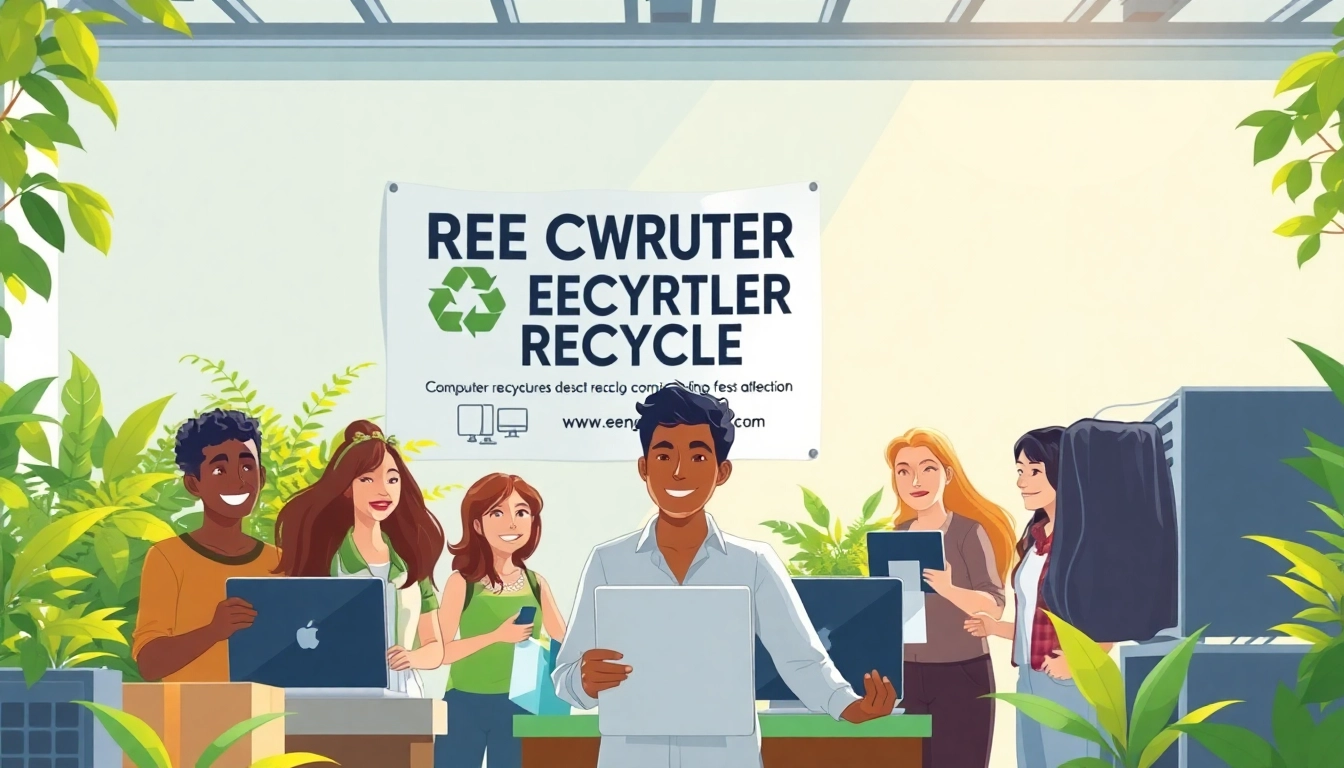The Importance of Free Computer Recycling
Free computer recycling is a vital process that offers numerous benefits to the environment, economy, and communities. As technology advances, electronic waste continues to accumulate at an alarming rate. Understanding the significance of recycling unwanted electronics, particularly computers, is crucial. This article aims to explore the various advantages of free computer recycling, how to locate services, prepare your computer for recycling, and what to expect from the recycling process. For those looking for more information, please refer to free computer recycling programs available in many areas.
Environmental Impact
The environmental consequences of improper electronic waste disposal cannot be overstated. Electronic devices contain hazardous materials such as lead, mercury, and cadmium. When these devices end up in landfills, they pose a significant risk to the soil, air, and water supplies. Recycling computers ensures that these harmful substances are managed safely and reduces the volume of waste that strains our landfills.
Moreover, recycling computer components allows for the recovery of valuable materials such as copper, aluminum, and plastics. These materials can be reused in manufacturing, thereby conserving natural resources and reducing energy consumption. For instance, recycling one million laptops can save enough energy to power 3,500 homes for a year. Such statistics highlight the pivotal role of recycling in environmental protection.
Economic Benefits
The economic arguments for free computer recycling are compelling. Firstly, recycling creates jobs in the green economy. From collection to processing and refurbishing, the recycling industry employs thousands of workers. Engaging in recycling programs can drive local economic growth and contribute to community development.
Additionally, the decrease in demand for raw materials contributes to lower production costs, which can ultimately lead to reduced prices for consumers. Moreover, businesses that invest in sustainable practices through recycling can enhance their brand reputation and attract environmentally conscious consumers.
Community Advantages
On a community level, free computer recycling initiatives foster a sense of civic responsibility. They encourage individuals to participate actively in creating a cleaner environment. Local recycling programs create opportunities for educational outreach, teaching community members about the importance of sustainability and responsible waste management.
Schools and non-profit organizations can also benefit from computer recycling programs, as refurbished computers can be donated to those in need, improving digital access and education. Strengthening community ties through collective recycling efforts has far-reaching positive effects on societal well-being.
How to Find Free Computer Recycling Services
Local Options
Finding local free computer recycling services can be straightforward. Many communities have established programs that cater specifically to electronic waste disposal. Local government websites often provide information on scheduled recycling days or designated drop-off centers for e-waste.
Additionally, public libraries, community centers, and environmental organizations frequently host events promoting electronics recycling. Networking with local community groups or exploring community bulletin boards can yield fruitful results.
National Programs
Various national organizations and programs offer comprehensive recycling services. These organizations often operate independently and partner with local entities to facilitate the recycling of electronic devices. It is advisable to check with national organizations committed to sustainability for more information on free computer recycling options available nationally.
Moreover, many major retailers implement take-back programs where they accept used electronics, regardless of purchase origins. Programs like these expand accessibility and encourage recycling.
Online Resources
The Internet is an invaluable tool for locating free computer recycling services. Numerous websites provide databases of recycling centers by zip code, allowing you to find options near you quickly. You can visit non-profit organizations focused on electronics reuse and recycling, which typically list resources and recycling drop-off locations.
Besides, platforms that advocate for environmental issues often provide educational materials on recycling processes and how to dispose of e-waste responsibly. Utilizing these online resources significantly increases your chances of finding adequate recycling solutions.
Preparing Your Computer for Recycling
Data Wiping Techniques
Before recycling your computer, it is crucial to securely erase your data. This means removing personal information to prevent identity theft and unauthorized access to sensitive materials. Simple deletion is insufficient, as recovered data can still be accessible.
Using data wiping software that complies with industry standards, such as the National Institute of Standards and Technology (NIST), ensures that your data cannot be recovered. Tools like DBAN or Eraser are designed to do just that, thoroughly overwriting your hard drive.
Physical Preparation
Physical preparation involves removing any non-recyclable components attached to your computer. For desktop systems, this includes peripherals such as printers, monitors, and cables that may not be accepted for recycling. It’s advisable to check the recycling guidelines of your chosen service to know what is acceptable.
Additionally, cleaning out any dust and ensuring that external surfaces are free of removable storage devices helps speed up the recycling process, making it more efficient.
Packaging for Transport
When preparing your computer for transport to a recycling facility, proper packaging is essential. Use sturdy boxes to prevent damage during transit. If possible, retain the original packaging or use bubble wrap for added protection.
Label the package clearly with disposal instructions if necessary, ensuring that your computer reaches its destination without issues. This meticulous approach reflects a commitment to the recycling process.
Understanding the Recycling Process
What Happens to Your Old Computer?
Once your computer is collected for recycling, it undergoes a systematic process. The first step typically involves sorting and categorizing the devices based on their material composition. This sorting allows the recycling facility to determine which components can be salvaged and which must be disposed of.
After sorting, the hardware is dismantled, and recyclable materials are separated from waste. Salvaged metals, plastics, and glass are processed and prepared for resale in manufacturing. Through this meticulous effort, thousands of tons of resources are saved each year from being relegated to landfills.
Recyclable Materials
Many recyclable materials can be recovered from old computers, providing an avenue to conserve resources. Metals like copper, aluminum, and gold can be extracted from internal components. Plastics used in casings can be repurposed into new products, and glass from screens is often recycled into new display technologies.
An estimate suggests that recycling one million laptops can prevent the waste of nearly 800 million pounds of carbon dioxide emissions equivalent. The recycling of materials not only reduces waste but also curbs the environmental impact of producing new components.
Responsible Disposal Methods
Responsible disposal extends beyond recycling to ensure that hazardous materials within electronics are handled safely. Facilities must adhere to environmental regulations governing the disposal of toxic materials, preventing contamination of water and soil.
Utilizing certified e-waste recyclers ensures that the recycling process meets environmental standards and allows for accountability. Individuals can verify a recycling program’s responsible disposal methods by looking for certifications or partnerships with certified organizations.
Frequently Asked Questions about Free Computer Recycling
What is free computer recycling?
Free computer recycling refers to organized programs that allow you to dispose of old computers and electronics without fees, focusing on sustainable practices to reduce waste and recycle materials.
How do I securely dispose of my data?
To securely dispose of your data, use dedicated software to wipe your hard drive according to industry standards, ensuring that recovery is impossible before recycling your device.
Are there any fees associated with recycling?
While many recycling programs offer free services, some may charge for specific items or special handling. Always check with your chosen program for their policies and any potential fees.
Can I recycle other electronic devices?
Yes, many computer recycling programs also accept other electronic devices, including printers, monitors, and mobile phones. Verify acceptable items with your program or facility.
What can I do if my computer is broken?
If your computer is broken, consult a recycling center to see if they accept damaged electronics. Many will allow you to recycle parts and components, even if fully unusable.












